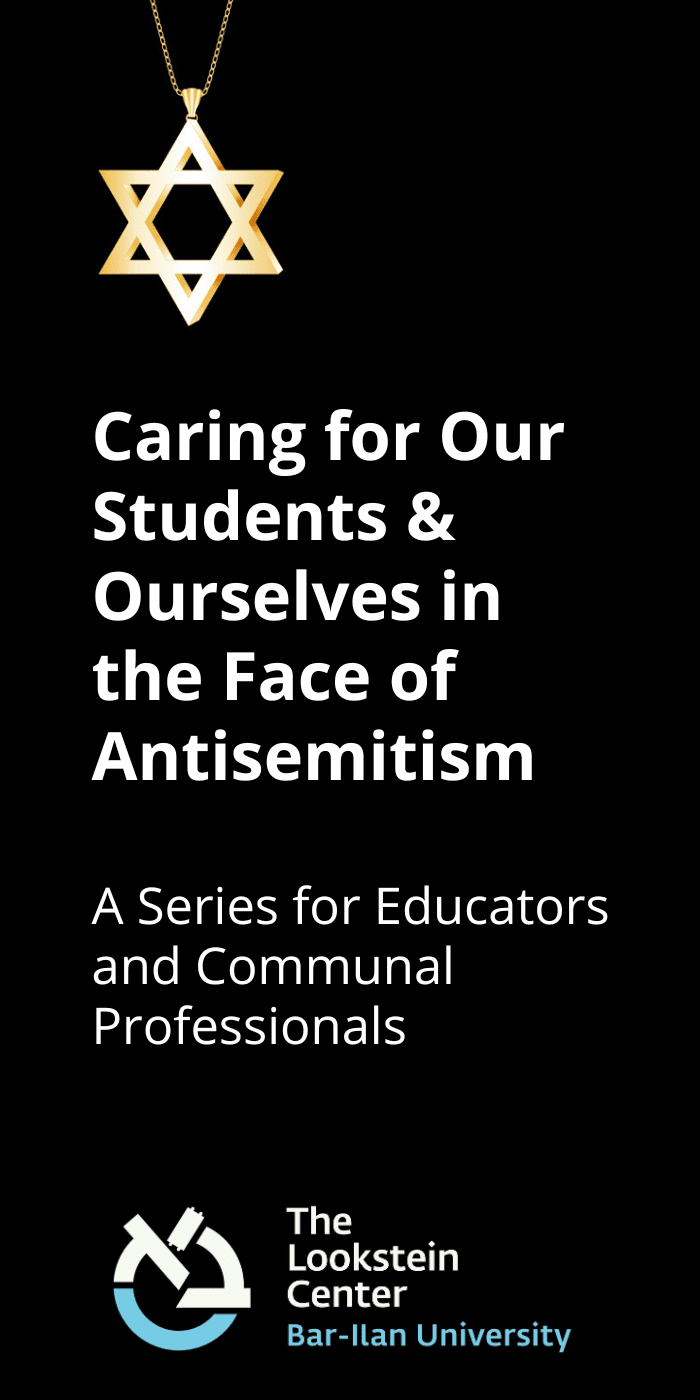Breathing Spirit into Jewish Education

Michal Fox Smart serves as a powerful voice for spirituality in Jewish education, pioneering innovation in the field for 30 years. Michal held leadership positions at IJS, Ayeka, Bi-Cultural Academy, Isabella Freedman, and co-founded TEVA. She is a Fulbright Scholar, Wexner Fellow, and Winner of the National Jewish Book Award.
People are influenced by diverse approaches to spirituality. Greek philosophy purports a rift between body and spirit; Christianity claims that spirituality is a matter of faith, divorced from the realm of action; Buddhism offers a contemplative model of spiritual practice that removes one from worldly matters. By contrast, Judaism (based on Genesis 2:7) understands that our essence as humans is a combination of earthly physicality (adam-adamah) and an intimate relationship with God that animates us (the spirit of life that God breathed into adam; neshama-neshima). Spirituality from a Jewish perspective is not an esoteric realm of experience divorced from the rest of life – it inheres in who we are and how we experience and navigate all of life.
How does this translate into our work as educators? It begins with the assumption that spirituality is innate in everyone; it is not something which needs to be inculcated in students. This being said, that innate spirituality needs to be validated and nurtured, and we need to avoid practices which stifle it.
For example, when I ask a group of students if they consider themselves spiritual people, I invariably get a mixed response. I point out that some of us make an effort to eat healthy food, to exercise, to get enough sleep, or to see a doctor regularly—and some of us do none of those things, yet we are all undeniably physical beings. Likewise, some of us daven regularly, learn Torah, light Shabbat candles, meditate, paint, or practice yoga—and some of us do none of those things, yet we are all spiritual beings. Our spirituality has as much to do with what we ate for breakfast or how we talk to our friends as it does with whether we pray or do anything we think of as explicitly religious. This is among the great insights of Jewish tradition.
Spirituality as Self-Awareness
Today’s youth are bombarded with messages about how they should look and the image they should outwardly project. Spiritual education can help them learn to turn inwards, to become self-aware—and this starts at the most basic level. What am I sensing in my body? What am I feeling emotionally? What thoughts are currently in my head? With the constant distraction of phones, social media, and music, students often lack the skill and capacity to sit quietly long enough to know themselves in these fundamental ways.
There is another part of us that is separate from our bodies, thoughts, and emotions. It can be aware of them and of our own actions, as an observer. Strengthening one’s connection to this conscious aspect of self, or soul, is essential to spirituality and our wellbeing because it can help us learn to recognize when our thoughts devolve into rumination, when strong emotions are surging and we may say something we’ll regret, or when our bodies are tired and instead of the sugar we’re craving perhaps we should rest. It can help us choose to do the right thing when peer pressure is high, recognize and challenge internalized bias, and it can help us learn not to condemn ourselves for our mistakes, but to extend self-compassion. It holds our infinite potential, our capacity to learn and grow, to do teshuva and show up better next time.
While self-aware, the soul also intuits that it is part of something larger than our individual selves. It senses its origins in eternity, its belonging in the Oneness of all life and being, and it yearns for connection. Spiritual education also involves honoring that yearning and that belonging, helping students to foster a personal relationship with God, and fortifying and celebrating their interconnection with the world around them. We come home to our essential and largest selves when we do both of these. I remember distinctly a hike in the Negev years ago when my intellectual belief in God evolved into a felt sense of God’s presence in my life. It has accompanied and sustained me ever since.
Tefillah
Judaism has particular ways of nurturing and expressing spirituality grounded in Torah, halakha, natural seasons and cycles, and Israel’s unique relationship with God. One of the greatest spiritual technologies we’ve developed is prayer, and this is a central place where spirituality can be cultivated in schools. As readers are likely aware, even though tefillah in school has the potential to offer students refuge from the constant and crushing pressure to perform, it is often challenging at best. In order to make tefillah achieve what it can, we need to think carefully about the tefillah environment and expectations.
If tefillah is focused on rote recitation, if it is monitored for attendance and discipline and keeping apace, if it is graded like the other subjects students study in school, then there is little likelihood that it will serve as a vehicle for spiritual refuge from a hectic and stressed school day. In fact, it will probably These practices can function more as a hindrance to spiritual growth than as an enabler of it.
To shape tefillah as a spiritual experience, it is necessary to focus on helping students develop into pray-ers. Are they in touch with their own hopes and fears, their sense of wonder, their remorse, and their aspirations? Can they stand in the presence of God and feel heard and held? Can they express thanks when they wake up in the morning—modeh or modah ani—and can that sense of gratitude, together with the sense of God’s belief in them (rabah emunatekha) and in the belief that they are essentially good (neshama tehorah) buoy them through difficult days?
For several years, I had the privilege of running tefillah workshops for girls in our day school. I would sometimes start by listening to the students’ concerns and struggles followed by teaching tefillot in the siddur that might support them. We once spent a week discussing what they did or didn’t like about themselves, how easy it was to criticize and even hate themselves, or to envy a classmate who seems to have it more together. We discussed academic and social pressure, their feeling that they never had enough time or weren’t smart enough, pretty enough, popular enough, or they lacked the fancy phone that others had. Then we explored specific prayers, for instance, the prayer of she-asani kirtzono, who made me exactly as God intended, and she’asah li kol tzorki, who has provided for me all I need. These tefillot countered those feelings of inadequacy and scarcity and invited students to affirm, “I am enough. I have enough. I have everything I need. I am perfectly who I should be. I’m okay. God is guiding my life.” It’s happened more than once that I’ve run into one of these students years later and they share that those lines of tefillah have remained meaningful to them. Even if the committed practice of a school is to recite the entire formulaic tefillah each day, there are opportunities to pause along the way and create anchor points of meaning.
In the Classroom
Another precious opportunity to foster spirituality in schools is when teaching Torah. While there is certainly value in focusing on textual literacy, skills, and content, spiritually-focused education demands making room for students’ urgent struggles and questions. The balance between the two helps to ensure that not only do students have the capacity to engage primary Jewish texts, but that they have the desire to do so as they recognize that Torah study provides wisdom and support for the hard work necessary in constructing a self and navigating the world.
This requires a rethinking not only of the way in which we teach texts but even in the choice of texts. In an environment designed to enhance student spirituality, texts will be chosen because of the wisdom they offer to guide the spiritual development of our students or for their capacity to help students lead lives of purpose, integrity, and wellbeing. We may choose to devote more time to Pirkei Avot or to Mussar texts that help students to develop their character.
Prioritizing spirituality in Jewish studies requires a paradigm shift, changing our goals and our choices of content, and altering the stance, role, and required competencies of our teachers. To impact students beyond their intellects, teachers need to be role models able and willing to share their own spiritual journeys, including personal moments of revelation, challenges, and questions. For that to happen, teachers themselves need to be on active spiritual journeys. And, as in tefillah, we need to consider the spiritual impact on students when their Jewish studies are graded.
Finally, we can do more to support spirituality in all subjects, including math and science. They are all opportunities to cultivate wonder and curiosity, to marvel at the world and become attuned to its rhythms and vitality, and to honor the ultimate mystery and miracle of our existence.
Spirituality is relevant to all aspects of education and students’ experience: the physical, mental, social, and emotional. The blend of earthly physicality and an intimate relationship with God, and the ability to sense and experience this in all aspects of our lives, is a profound gift of Jewish tradition that we can share with our students. It will help them to thrive and can enliven our schools, as well.



Michal Fox Smart serves as a powerful voice for spirituality in Jewish education, pioneering innovation in the field for 30 years. Michal held leadership positions at IJS, Ayeka, Bi-Cultural Academy, Isabella Freedman, and co-founded TEVA. She is a Fulbright Scholar, Wexner Fellow, and Winner of the National Jewish Book Award.
Reach 10,000 Jewish educational professionals. Advertise in the upcoming issue of Jewish Educational Leadership.




